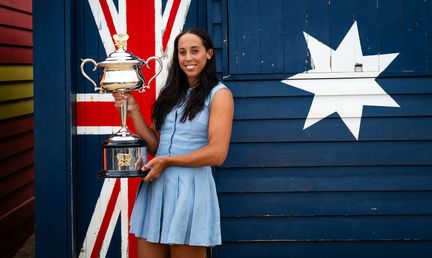WUHAN -- After nine months of nonstop action, the Hologic WTA Tour has settled into Asia for the final stretch of the regular season. With the Grand Slam calendar closing after the US Open and the last of this year's WTA 1000 events unfolding at the Dongfeng Voyah · Wuhan Open, it wouldn’t be surprising if some players’ thoughts start drifting toward offseason vacations and easing into cruise control.
Wuhan: Scores | Schedule | Draws
For the tour's elite, the six-week run through Asia can redefine what came in the nine-month run-up. The Asian swing began the week after the US Open with the WTA 500 in Seoul, back-to-back WTA 1000s in Beijing and Wuhan, and back-to-back WTA 500s in Ningbo and Tokyo to finish the regular season. Less than a week after Tokyo, the WTA Finals Riyadh awaits the tour's elite eight.
"It's kind of weird because your brain is like the Grand Slams are over so you're kind of relaxed," Coco Gauff said. "But it's a lot of points, a lot of money at stake. It's two 1000s left and there's a couple of 500s. They're big tournaments and you want to win them."
Gauff did just that last week at the China Open, where she swept the field to win her first title since January. The win bolstered her chances to qualify for the WTA Finals for a third consecutive year. She rose two spots to No.4 on the PIF Race to the WTA Finals, overtaking Jasmine Paolini and Jessica Pegula.
"A lot of people think after the US Open it's done, but no," Pegula said, "there are two very big events that can really change the course of the end of the year.
"Especially for top players, the end of the year rankings and end of the year Race, that's really important. That's something we're really focused on."
But there's also the hidden perk of carrying those 1,000 ranking points for the next 12 months. It's a benefit that paid off greatly for both Gauff and Pegula this season. Both Americans enjoyed a successful post-US Open finish in 2023, with Gauff making the Beijing semifinals and WTA Finals semifinals, and Pegula making the final in Tokyo, winning Seoul and making the final in Cancun.
As a result, despite her subpar start to the 2024 season, which included missing four WTA 1000 tournaments and a Grand Slam in the first six months of the year with an injury, Pegula's ranking wasn't significantly impacted. Her points from last year's Asian swing buoyed her ranking, and she remained in the Top 5 for all but seven weeks.
Last year, the biggest year-end surge came from Iga Swiatek. After ceding the No.1 ranking to Aryna Sabalenka after the US Open, Swiatek won Beijing to close her gap on Sabalenka and then retook the top ranking in the final match of the season in Cancun.
"You put in a lot of work throughout the whole year so now that it's the end, have some appreciation for getting through most of the year," Pegula said. "It's the last swing, give it everything you got.
"There's still a lot at stake. I think some people either tend to shut down or dread this part of the year but you have to kind of find a way to refresh and reset."
Sabalenka is closing in on retaking the No.1 ranking from Swiatek, who opted out of both Beijing and Wuhan to focus on hiring a new coach. But the year-end No.1 ranking will most certainly be decided at the WTA Finals Riyadh.
As two-time champion Sabalenka returns to Wuhan eyeing a three-peat, she also hopes to go deep just to stay sharp.
"I think between Wuhan and Finals is like three weeks of gaps," Sabalenka said. "It means if you don't reach last stages of the tournaments here, then you have a really bigger gap in between, which is not so good before going to the last tournament of the year where every match is a high-intensity match.
"For me, it's really important to do well here so I'm just better prepared for the Finals and I have more matches in my pocket before the last push of the season."
But when it comes to the player with the most pressure over the next weeks, that honor goes to World No.7 Zheng Qinwen. In a season in which she made her first Grand Slam final at the Australian Open and won China its first gold medal in singles at the Olympics, her homecoming has brought a whirlwind of energy wherever she has been entered. In Beijing, she played to soldout stadiums on her way to the semifinals.
Pegula noted how a player's visibility fluctuates based on their ranking, saying it's interesting to see how attention shifts depending on where they stand.
"I think that's really cool and it makes our sport special," Pegula said. "Hopefully we can keep highlighting that.
"Obviously, you're seeing that a ton with Qinwen. The stadium being full after her gold medal win is really cool and it shows how big sports can be."
This week, the 20-year-old Zheng returns to Wuhan, the city where she honed her tennis skills. She's been given a hero's welcome. Her face is adorned on the side of buses all over the city, her advertisements prominently displayed at checkout stands and street signage.
"People have big expectations on me here," Zheng said. "They want me to play as much as I can. I hope I can stay here longer. But tennis is always tough to predict.
"I know the people in Wuhan, they all want to come to see me because I can feel the passion already when I'm walking on the street. Once they recognize me, everybody start to come around asking for my signature, asking the photos. I love this atmosphere."






![Madison Keys won her maiden Grand Slam title at the 2025 Australian Open by saving one match point against No.2 Iga Swiatek in the semifinals to win 5-7, 6-1, 7-6[8] and then beating No.1 Aryna Sabalenka in the final.](https://photoresources.wtatennis.com/photo-resources/2025/01/25/a8231ba0-92b7-41bf-a0c0-22a2a52f7834/GettyImages-2195186933.jpg?width=451&height=268)
![Madison Keys saved one match point as Iga Swiatek served at 6-5 in set three of their Australian Open semifinal. Keys won 5-7, 6-1, 7-6[8] to reach her second major final.](https://photoresources.wtatennis.com/photo-resources/2025/01/23/600d4aab-2bbe-4fc0-b44c-39334ee63c9e/Keys-SF-Jason-Heidrich-Icon-Sportswire.jpg?width=451&height=268)


